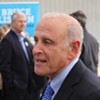Published August 28, 2013 at 6:28 a.m.
Fair Game is Seven Days’ weekly political column.
Two years and $800,000 after launching an ambitious political advocacy group, Bruce Lisman says he’s preparing for “phase three” of his peculiar bid to reshape Vermont state government: a boots-on-the-ground, Statehouse lobbying campaign.
“People always say, ‘So what are you going to do with this? Send out more reports?’ Well, maybe,” the retired Wall Street investment banker says. “But what we’re going to try to do is move the state and those who would govern us. So we intend to be in Montpelier in January.”
What Lisman and his nonprofit advocacy group, Campaign for Vermont, will lobby for remains to be seen, but you can bet it’ll have something to do with his favorite hobbyhorse, “transparency.” He hints it may involve a new ethics code and financial-disclosure mandate for public officials.
For many Vermont politicos, the question isn’t what phase three of Campaign for Vermont will look like but whether Lisman is secretly plotting a phase four: challenging Gov. Peter Shumlin in 2014.
“We’re all suspicious it’s something, because that’s how we’re built,” says the state’s top elected Republican, Lt. Gov. Phil Scott, who’s counted himself out of the gubernatorial race. “But I’ve asked him point blank what he wants to do, and he says, ‘I just want Vermont to be a better place.’”
The speculation isn’t unreasonable.
Since November 2011, Lisman has plowed more than $810,000 of his own money into Campaign for Vermont, he says — roughly $300,000 of which has gone to purchase radio, TV and online ads starring Lisman himself.
“Imagine a world in which all Vermonters can feel secure and have the opportunity to prosper,” Lisman says in one typically generic ad as he leans casually against the counter at a diner. “Well, that’s our mission at Campaign for Vermont.”
Meanwhile, the 66-year-old Shelburne resident has been roaming the state, taking local power brokers out to breakfast and holding a dozen community forums to brainstorm solutions to the state’s problems. This summer, he hired seven part-time, paid interns to staff a “grassroots advocacy team” charged with marching in parades and manning booths at county fairs. As of last week, more than 700 Vermonters had signed on as CFV “partners,” 5000 had put themselves on its mailing list and 7170 liked the group on Facebook.
While that may sound like the handiwork of a candidate-in-waiting, Lisman and his associates say it’s no such thing.
“It’s a really interesting thing in Vermont: The minute you open your mouth and start voicing opinions that aren’t stupid, everybody tells you that you can run for public office,” says Mary Alice McKenzie, a CFV cofounder and executive director of the Boys & Girls Club of Burlington.
Over coffee one recent morning at Trader Duke’s in South Burlington, Lisman gently chided a political columnist for broaching the subject of electoral politics. Though he’s committed himself to influencing public policy, he says, he wants to do it “in an unconventional way.”
“The normal way is go into politics, run for the legislature, be a selectboard member,” he said. “I thought there would be a different path, and that would be to present ourselves as we think we are: nonpartisan, not connected to parties.”
Lisman was joined at the breakfast table by third-generation lobbyist Shawn Shouldice, who coordinates CFV’s work out of her Montpelier office, and Ben Kingsley, a fresh-faced Norwich University grad and member of the “grassroots” team.
For much of the hour, Lisman argued that his was a new approach to advocacy, but he kept falling back on empty political clichés: “practical ideas,” “alternative paths” and “pragmatic solutions to thorny problems.”
Asked to sum up his group’s core philosophy in a sentence or two, Lisman rambled on and on.
“We think there are challenges, and we think we can offer solutions,” he said in his best shot at a succinct answer. “And we think we can convince, through coalition building, the people we elect to govern us to change their perspective and choose a new path.”
Say what?
For a guy who forswears any interest in public office, his answer — or nonanswer — to the question of whether he’d challenge Shumlin was as dodgy as answers get.
“Well, right now we are entirely focused on Campaign for Vermont,” he said.
Asked whether that was a yes or a no, Lisman responded, “No plans to.”
No plans to. OK. Does that mean you are affirmatively saying, “I will not run for governor in 2014?”
“I’m affirmatively saying this is what I do. This is what I’m good at,” he said.
That’s not very affirmative.
“I think it is,” Lisman countered.
But you’re not ruling it out, obviously.
“I don’t give it any thought,” he said. “I don’t take it seriously.”
Neither do some in the professional political class.
“There’s no shortage of people in this world who are deluded enough to think they can be governor,” says Democratic lobbyist Kevin Ellis of KSE Partners. “These are junior-varsity people who think they can compete against professionals. Peter Shumlin is a professional. And Peter Shumlin will tear him limb from limb.”
On the other side of the aisle, Vermont Republican Party chairman Jack Lindley says he’s not going out of his way to recruit Lisman — and he too is skeptical about whether the Shelburne resident can overcome his politically problematic past.
“What can I say? How else can I better describe it? He’s made his money on Wall Street and he’s a Vermonter now,” Lindley says. “Nobody should denigrate his ability to do that, but there’d be some issues that would arise around his background, I suppose.”
Scott echoes the point, comparing Lisman to another wealthy self-funder who lost in a landslide to Sen. Bernie Sanders in 2006.
“I thought Rich Tarrant was an interesting guy, as well, who had a lot of good ideas, but because he had a lot of money, that was one of his downfalls,” the lite gov says. “I’m not sure that’s an attractive attribute necessarily for a candidate.”
That may be true, but there’s no denying that the Old North End native is a Vermonter — and a self-made man. After graduating from the University of Vermont he moved to New York City in 1970 to work as a file clerk, moonlighting as a bartender and taxi driver.
Lisman joined the investment bank Bear Stearns in 1984 and became co-head of global equities three years later. Over the next 21 years, he says, he grew his division from a $50 million backwater into a $2.5 billion business, eventually managing 2350 people.
But in March 2008, Bear Stearns collapsed under its own weight. After overleveraging itself on risky derivatives, the company was forced by the Federal Reserve to sell itself for $2 a share to J.P. Morgan — a decision that made Lisman “furious,” according to the New York Times.
On the afternoon of March 11, wrote the Wall Street Journal’s Kate Kelly, “the usually taciturn” Lisman “climbed atop a desk near his fourth-floor office and demanded his traders’ attention.”
“‘Let’s stay focused,’ he bellowed. ‘Keep working hard. Bear Stearns has been here a long time, and we’re staying here. If there’s any news, I’ll let you know, if and when I know it.’”
Five days later, the company was gone.
Unlike most Bear employees, Lisman was hired by J.P. Morgan to oversee its new acquisition. But he stayed only a year, selling his 5th Avenue condo in September 2009 for $12.8 million to move to Shelburne, where he’d built a home.
Lisman clearly recognizes that Wall Street doesn’t sell in Vermont.
In a letter he wrote two years ago on Campaign for Vermont’s website, he said that the state “must diligently make sure that the principles of Main Street prevail over the excesses of Wall Street,” adding that “too big to fail” is not a “Main Street concept.” That note has since been removed.
Lisman says he bears no responsibility for Bear’s excesses and ultimate failure.
“We had nothing to do with the end of the world — the end of the stock market,” he says, differentiating the global equities division he ran from those that pushed Bear under. “I wasn’t part of that business. I had little to do with it. My hands were completely full.”
He says he perceived problems at the company ahead of the crisis but was powerless to address them.
“Could I have done something? No, the answer is not much. And nothing to change the course of events at my firm or the world,” he says. “It’s silly for people to think — they must be reaching — to think that I have some unusual responsibility.”
After settling down in Vermont, Lisman set about to meet with the state’s movers and shakers. In November 2011, he formally founded CFV with McKenzie and Tom Pelham, an Arlington independent who served in the Snelling, Dean and Douglas administrations.
“I think the underlying premise was if you look around the state, things aren’t going well,” Pelham says. “There’s no place in Vermont where one can go to chart a different course. And that, I think, is the genesis of Campaign for Vermont.”
Adds McKenzie, “There hasn’t been a voice for the moderates. It’s an important vehicle to give moderates a place to voice their opinions. It’s really worthy work.”
What are those opinions? The group has produced papers on education reform and government transparency, and has advocated against Shumlin’s single-payer health care proposal and his energy policy.
For many political observers, CFV and its founder have become a bit of a Rorschach test. Nobody seems to agree on what they stand for.
Former Vermont Democratic Party chairman Jake Perkinson calls the group’s politics “on the conservative side of the spectrum.”
But according to David Coates, who has served with Lisman on the boards of National Life and the University of Vermont, “This is a man who when he was in New York was a liberal Democrat. People keep saying he’s a right-winger, but he’s not.”
“The easy reportage on Bruce Lisman is that he’s a wealthy businessman who is working to improve the business environment in Vermont,” says Hinesburg writer Bill Schubart, a friend of Lisman’s. “The reality of it is that he cares about every aspect of Vermont, including education, the social safety net, and is a much, much more nuanced individual than many people were aware.”
Lisman himself will only say he “was a longtime Democrat” who “gave it up along the way.” According to Shelburne town clerk Colleen Haag, he voted in the Republican presidential primary in March 2012. But given the lack of a race on the Democratic side, who didn’t?
Lisman’s history of political contributions is varied. Since 1990, he’s donated $56,400 to federal candidates of all stripes. Recipients have included Tom Daschle, Barack Obama and Bill and Hillary Clinton on the left — along with Bob Dole, Orrin Hatch and Richard Shelby on the right. In the past four years, he’s given regularly to the Vermont Republican Party — but also to Vermont Democrats such as Peter Welch and Patrick Leahy.
Whatever his politics, it’s unclear precisely what Lisman’s accomplished thus far with his six-figure investment. Though he claims he’s influenced Shumlin’s rhetoric, it’s hard to spot a clear policy victory.
“I don’t think he’s really moving the needle to advance the causes he cares about so much,” says Vermont Public Interest Research Group executive director Paul Burns. “It seems to be more about self-promotion than anything else.”
Lisman takes the left’s criticism in stride — and he hopes to win over the skeptics one by one.
“Maybe they’re afraid we’ll succeed in offering up better ideas than they’ve managed so far,” he says. “Maybe the right should feel the same way. Who knows?”
More By This Author
Speaking of Senator, Bernie Sanders
-

Vermont Awarded $62 Million in Federal Solar Incentives
Apr 22, 2024 -

Man Charged With Arson at Bernie Sanders' Burlington Office
Apr 7, 2024 -

Police Search for Man Who Set Fire at Sen. Bernie Sanders' Burlington Office
Apr 5, 2024 -

Bernie Sanders Sits Down With 'Seven Days' to Talk About Aging Vermont
Apr 3, 2024 -

Sociologist and Author Nikhil Goyal Talks Education, Books and Bernie
Dec 6, 2023 - More »
Comments
Comments are closed.
From 2014-2020, Seven Days allowed readers to comment on all stories posted on our website. While we've appreciated the suggestions and insights, right now Seven Days is prioritizing our core mission — producing high-quality, responsible local journalism — over moderating online debates between readers.
To criticize, correct or praise our reporting, please send us a letter to the editor or send us a tip. We’ll check it out and report the results.
Online comments may return when we have better tech tools for managing them. Thanks for reading.















































